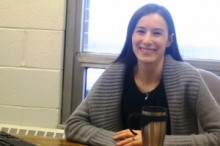 Includes an excellent profile of recent UW Astronomy Ph.D. Sarah Loebman as an exemplar of the sort of scientist we seek to create:
Includes an excellent profile of recent UW Astronomy Ph.D. Sarah Loebman as an exemplar of the sort of scientist we seek to create:
“She specializes in comparing the evolution of galaxies simulated on supercomputers with actual observations of the Milky Way from the Sloan Digital Sky Survey (SDSS) to learn about processes by which our own galaxy might have formed. For example, she is currently comparing the distribution of iron and oxygen in stars at the outer edges, or stellar halo, of simulated galaxies with the observed iron content of stars in the Milky Way …
“Loebman worked with data management experts from the UW computer science department. She became skilled in data science as she finished her Ph.D. in astronomy at the UW. It’s that multi-disciplinary expertise, she says, that helped her land a post-doctoral position at the University of Michigan.
“Loebman exemplifies the new scientist that the Moore/Sloan grant aims to help universities train in a more deliberate way. She spent the summer working with senior leaders in a range of scientific fields at the participating universities to help structure the program. They discussed common data-management approaches across disciplines, which tools can and can’t be shared among biologists and astronomers, for example.”

